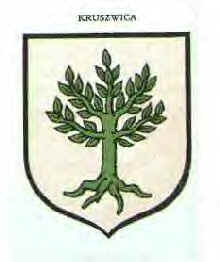|
Music: Clarinet Polka |

Kruszwica
Owing to the frequent raids of the Norsemen the people of this region early
organized an effective military force of defense. Under the protection of the
military bands and their chiefs the fields could safely be cultivated and the
little, fortified towns (grody), which became places for the transaction of intertribal
business and barter for common worship and for the storage of goods
during a foreign invasion could be successfully defended and the wrongs of the
people redressed. The military bands and their leaders soon became the unifying
force, and, the fortified towns the centers of a larger political organization,
with the freeman( Kmiec or Kmeton) as its base. The first historical town of
this nature was that of Kruszwica, on the Lake of Goplo. It soon gave place to
that of Gniezno (called Gnesen by the Germans) or Knezno, further west, which by
its very name indicates that it was the residence of a Knez, or prince or duke.
In time Poznan (Posen) became the princely town, and the principality began to
assert itself and to grow westward to the Oder, southward to the Barycza and
eastward to the Pilica Rivers. In the east this territorial expansion met with
the armed opposition of another large tribe, the Lenczanians, which was
similarly organized under a military ruler and which occupied the plains between
the Warta, Bzura and Pilica Rivers. Further east, in the jungles of 'the middle
course of the Vistula to the north of Pilica, lived the most savage of the
Polish tribes, the Mazurs. This tribe was the latest to come under the
sovereignty of the principality which began its political existence on the bank
of the Goplo Lake under the leadership of the wheelwright Piast, whose dynasty
ruled the country till 1370. To the north of the Netze River between the Oder
and the Baltic, lived the northernmost of the Polish tribes known as the
Pomorzanie, or people living by the sea. "Po" in Polish means
"by" and "morze" the sea; hence the name of the, province
Pomorze, later changed by the Teutons to Pomerania.
Some historical writers attribute the change in the political organization of
the primitive Polanie tribe to the influence of foreign commerce which for
geographic reasons had early centered around the Goplo. At that period the lake
was a very large body of water with a level at least ten feet higher than at
present. The many small lakes now existing in the region were in all probability
a part of Goplo, and the valleys of the vicinity constituted the bottom of the
lake. There are many reasons to believe that such was the hydrography of the
section in that remote age. In his description of Goplo, written five
hundred years ago, Dlugosz, a Polish historian, speaks of a vast body of water,
leading us to believe that the lake then was much larger than it is at the
present time. There is reason to believe that five hundred years previous to
this historian's time, before the primeval forests were cut, the lake was still
larger. The supposition that Goplo at the time of its highest level was
connected by means of small navigable streams with the river's Warta, Oder and
the Vistula is quite plausible. The constructive 'fancy of the economic
historian sees flotillas of the Pomeranian merchants moving to and fro from
Stettin down the Oder and Netze. Here they met merchants from the east, the
southeast and the southwest of Europe. The Byzantine, Roman and Scandinavian
cultures met at Kruszwica, the largest town on the banks of this vast internal
sea of Poland, and exercised a revolutionary effect upon the modes of thought
and the political institutions of the tribe. Otherwise the sudden
transformation which took place from the tribal and communal organization of the
people, which still existed in the second half of the eighth century, to the
militaristic structure of society with a strong princely power, as is known to
have existed in the ninth century, becomes almost unaccountable. The pressure
from the west and north was, no doubt, an important element, but it alone would
hardly seem sufficient to explain the change. Economic and cultural reasons had
unquestionably exercised a great influence in the rapid molding of a new form of
political life which was more adapted to conditions that had arisen since the
change from nomadic pursuits to settled agriculture. 1015~
Kruszwica (detached from Kolobrzeg) - Poland